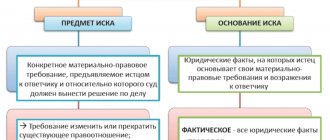Home / Eviction / Why send a notice of eviction from an apartment (sample attached)?
In some situations, it becomes necessary to evict a tenant from an apartment, hostel or house who has lost the right to use it. The procedure is simplified if he agrees to voluntarily vacate the square meters. Otherwise, you will have to go to court.
This means that you will have to prepare to file a claim, but first you need to use such a tool for pre-trial dispute resolution as a notice of eviction from the apartment.
Reasons
Reasons for eviction from an apartment may include::
- Failure to pay utility bills for six months;
- Late mortgage payments;
- Systematic violation of the rights and interests of other residents of the house;
- Expiration of the premises rental agreement;
- Deprivation of parental rights of a minor child who lives in the premises;
- Changing the purpose of housing, as a result of which it is transferred to non-residential stock;
- Use of residential real estate for purposes other than its intended purpose: production, warehouse, etc.;
- Emergency condition of the premises;
- Change of place of residence if the tenant occupied housing under a social tenancy agreement.
This is not an exhaustive list of grounds that give the right to require a tenant to leave the premises. A notice of eviction is issued and officially served on the addressee.
If the loan for the apartment is not paid on time, the collateral holder (the bank) has the right to demand eviction after two months of delay. An additional condition is that the borrower is not able to make payments under the terms of debt restructuring.
Violation of the rights of other residents of the house means:
- Unsanitary living conditions;
- Noise, loud music at night;
- Causing damage to both common areas and residential premises.
The social tenancy agreement provides for its termination if the tenant moves to live in another locality.
If a building is determined to be unsafe, its residents are evicted. They are provided with similar premises or compensation.
In all of these cases, eviction becomes more difficult if the tenants refuse to comply voluntarily. For example, if a lease agreement for a premises expires, its owner has the right to ask the tenants to leave the premises. If they refuse, he will have to go to court.
As a rule, such cases are considered in one meeting.
The following measures cannot be taken:
- Threaten with violence;
- Use force to force someone to leave the premises;
- Place the property of residents on the street or in the entrance, causing damage to it.
Such actions are regarded as arbitrariness; the perpetrator can be prosecuted under Article 330 of the Criminal Code of the Russian Federation.
Making a claim
There are no regulations that would regulate the content of the claim.
When drawing up claims, legal entities are guided by the general principles of business correspondence. As for eviction claims sent by individuals, the only requirement for them is that the text of the claim contains a clear answer to the questions “Who wants, from whom, what and why.”
From the point of view of the internal structure, the claim is practically no different from well-known statements and complaints, with the exception that the operative part of the claim contains not a request, but a demand.
In general, the claim consists of the following structural elements:
- Full name (name) of the addressee;
- Full name (name) of the author of the claim;
- information about the grounds for filing the claim, that is, the grounds on which the author of the claim demands eviction - violation of the terms of the rental agreement, divorce, termination of the employment contract, etc.;
- scheduled eviction date;
- additional conditions, for example, payment of debt, inspection of the premises, other circumstances;
- list of applications (if necessary). Thus, the claim may be accompanied by a calculation of debt or damage;
- date of filing the claim and signature of the author.
Pre-trial settlement of the issue
So, the main problem that the owner of the premises may face is the refusal of tenants to voluntarily evict. The only way to force it is through the courts. That is, a statement of claim has to be prepared. Then the place of the notice of eviction from the apartment is not clear.
This document fulfills the purpose of the claim. Before going to court, it is recommended to follow the claim procedure for resolving a dispute, within the framework of which :
- The grounds for eviction are documented.
- Using these materials, a claim-notification is prepared and sent.
- Correspondence, negotiations and additional recording of the grounds for the tenant's discharge are carried out.
The court is reluctant to accommodate the plaintiff, who demands to deprive the defendant of the right to reside in any premises. A compelling and carefully documented basis must be provided for the applicant's claims to be granted.
During negotiations and correspondence, it must be indicated that in the event of a judicial review of the dispute, the defendant will incur additional financial costs. This encourages the tenant to voluntarily move out of the premises. Therefore, the document is not only formal in nature, fulfilling the purpose of the claim. With its help, you can resolve a dispute without bringing it to court.
Preparation and submission of a claim
Preparation includes the collection of factual materials on the basis of which a claim is drawn up and submitted. In some cases, the process is simplified by the fact that the documents are already in hand, namely:
- If utility bills are not paid for six months, unpaid bills will be issued;
- In case of late payments on a mortgage - an agreement, a notice of late payments;
- Upon expiration of the rental agreement, a copy of the agreement;
- In case of deprivation of parental rights of a minor child who lives in the premises - a corresponding court decision.
If the building has changed its purpose, is converted into non-residential use, or is considered unsafe, an appropriate decision from the city authorities is required.
All these documents are already ready and are in the hands of interested parties. It is enough to make copies of them and attach them to the notification. It is more difficult with other evidence base, which is not so easy to collect. These include :
- Acts on the bay, protocols on administrative violations, etc. – in case of systematic violation of the rights and interests of other residents of the house.
- Acts drawn up by the management company, protocol of administrative violation, testimony of neighbors, etc. – when using residential real estate for other purposes.
- Response to a request from the migration service, from the place of work - when changing the place of residence, if the employer occupied housing under a social tenancy agreement.
systematic, comprehensive actions are required from stakeholders over a long (relatively) period of time.
Not everyone has the patience; such people are advised to seek help from lawyers or a detective agency. The claim can be delivered in person against signature, or sent by post - a recommended letter with a list of the contents and a receipt.
Arbitrage practice
The practice of conducting such cases is extensive. Often, discharge still occurs in the following cases:
- The person being discharged is not a member of the plaintiff's family.
- The defendant moved out of the apartment or did not live at all.
- The citizen has a new family and he has a place to live.
Citizen A. applied to the court to recognize that his son P had terminated the right to use the apartment. He had previously been moved in and registered, but had not lived with his father for a day. Since 2 people are registered, utility bills are calculated for two according to the tariff. These expenses are too burdensome for a pensioner. P.'s son actually lives elsewhere. The basis for my son’s discharge was Art. 83 Housing Code of the Russian Federation. The claim was granted.
Warning about leaving the apartment
The document in question does not have any established form. But in order for it to be accepted for examination in court as evidence of the direction of the claim, it must contain :
- Passport details of the tenant who is subject to eviction, his place of registration.
- Legal name of the organization or passport details of the property owner, their address.
- The name of the document is a notice of eviction or discharge.
- Brief description: grounds for discharge, reference to documents and legal norms.
- Requirements.
- Date and signature of the originator.
Sample letter
To make it easier and faster to draw up a notice, it is recommended to look at a sample document. Using its basis, it is enough to substitute your own data, and the claim is made.
The samples are good because they allow you to see the necessary grounds for eviction, their documentary support, and some techniques used by professional lawyers. If necessary, you can additionally collect missing acts, messages, testimony, and only then send a notification.
The document is available for download
Tenant eviction requirements
When writing at the end of the notice what exactly a person must do, it is imperative to provide a period during which he must vacate the premises. By law it is 7 days, the alternative is specified in the rental agreement.
By indicating incorrect demands in violation of the law or contract, for example, to evict within 24 hours, the owner gives a reason for delaying the process and grounds for refusing the claim.
Additionally, upon vacating the premises, you can demand compensation for the damage caused and pay off the debt for utilities. The obligation to pay for electricity, gas, heating, and rent for the period of stay until the last day before eviction is not lifted.
Read more about eviction for debt here.
List of documents attached to the claim
The following documents must be attached to the claim for eviction and deregistration:
- plaintiff's passport;
- documents on the right of ownership of property;
- power of attorney to represent interests (if the plaintiff is a legal entity);
- representative's passport;
- documents confirming the loss of the right to use the apartment;
- documents confirming the grounds for eviction;
- receipt of payment of state duty;
- other documents that may be important for the consideration of the case.
Algorithm for further actions
If the person refuses the requirements specified in the notification, it is necessary:
- Draw up and file a claim in court.
- Defend your position in court and get a positive decision.
- Require the defendant to vacate the premises within 7 days after the decision has entered into force.
But even after this, the housing may remain occupied. Then you need to contact the bailiffs . They are engaged in forced evictions. If the defendant refuses their request to move, police officers are called in and use force. The homeowner is required to submit an application to the territorial body of the Social Insurance Fund.
Let's find out how a statement of claim for eviction and deregistration is drawn up by reading a special article prepared by the editors of our website.
Arbitrage practice
A resident of the city of Kolomna contacted a law firm because he could not evict a tenant from his own apartment. The latter is a stranger to him, registered on the basis of a residential lease agreement. However, there were regular complaints from neighbors about the tenant's violation of public order.
During the investigation, it was established that the tenant was using the apartment for other purposes and was subletting it on a daily basis, which is prohibited by the terms of the contract. During two weeks of work, facts of settlement of unauthorized persons on a paid basis were documented, and the drawing up of two protocols of administrative violations was initiated. In addition, witness statements were collected.
All evidence is presented in a notice to the person, he is told the prospects of financial losses in the event of a judicial review of the dispute. The tenant complied with the terms of the claim, moved out voluntarily, and compensated the owner for legal costs.
Responsibility for fictitious registration
It happens that owners register completely strangers who need registration. Of course, all this is not free; they make money in this way in many regions of the country. There are other cases where registration may be considered fictitious. As a result, when trying to sue to deregister such an illegal registered person, serious problems may arise for the owner himself.
It is quite easy to understand that the registration is fictitious, because 10-15 people can be registered in one apartment, and they have absolutely no family ties among themselves. Of course, this is not proof, but it makes you think.
Important! Registration is also considered fictitious if the person does not live at the place where it is located or if it was carried out using forged documents.
Punishment options for the owner and the registered person, provided for by the Criminal Code of the Russian Federation:
- A fine is the mildest punishment. The amount of the administrative penalty is 100-500 thousand rubles.
- Forced labor for the benefit of society. The maximum period is 3 years.
- Deprivation of liberty. This measure, first of all, will concern the owners, because if they do not give their permission for fictitious registration, the person will not be able to register in principle. The maximum period of stay in a colony is 3 years.
Legal assistance
You can make a demand in any form, either using company forms (if they were developed and approved by the lessor company) or without them. The main thing is that the notification contains the following information:
- Name or title of the addressee (tenant).
- An indication of the premises illegally occupied by him (address and, if possible, cadastral number of the property).
- The grounds for which he must vacate this non-residential premises.
- The period within which the release must be made. The legislation does not contain instructions on how much time should be given to an unscrupulous tenant, and therefore one should be guided by the rule about the reasonableness of the period. In business practice, it is customary to give at least 180 days to fulfill the requirement - but this is not a mandatory condition.
Drawing up and sending a notice is a rather troublesome procedure. Without legal knowledge, it is easy to make mistakes and completely delay the eviction of a tenant. It is important to understand that a universal notification form simply does not exist. Before filling out a notice to vacate the premises, you need to understand the nuances of the situation.
- Due to frequent changes in legislation, information sometimes becomes outdated faster than we can update it on the website.
- All cases are very individual and depend on many factors. Basic information does not guarantee a solution to your specific problems.
That's why FREE expert consultants work for you around the clock!
- via the form (below), or via online chat
- Call the hotline:
- Moscow and the Region –
- St. Petersburg and region –
How to properly file a claim for eviction
Extract from a permanent place of residence is strictly subject to the Law on Extract from an Apartment. The procedure for carrying out such a procedure is also indicated there. When a particular citizen wishes to deregister, he must personally go to the FMS with a certain list of documents. The list is small - this is an identity certificate, ownership, state tenancy, house register, military ID, departure sheet and an appropriately completed application. In order to comply with the rules for checking out of an apartment, it is important to provide information about the absence of debts.
The checkpoint assigned to the organization by the tax authority at the location of this separate division is indicated. The checkpoint assigned to the tax authority at the location of this separate division is indicated.
Deadlines
There is no clear regulation of the deadline for filing a claim. There is a rather vague provision of the law that the claim must be filed within a reasonable time before the date of the scheduled eviction.
The reasonableness of the timing is determined independently, but it should be borne in mind that eviction (and, accordingly, finding new housing) requires a significant investment of time.
Based on this consideration, we recommend filing a claim at least one month before the scheduled eviction date.
A reasonable period should not be defined as a shortened period of time. Most likely, in the event of a legal dispute, the judge will consider a period of less than a month unreasonable.
Which body carries out the accounting?
It is also important to contact the address, that is, the authority that has the authority to deregister/register.
Options to contact:
- Housing office, if the apartment is part of the housing stock: state, municipal or special.
- Board of a housing construction cooperative.
- FMS.
- MFC.
It is very important to understand that, regardless of the body to which documents are submitted, the FMS is responsible for extracting and registering citizens. The remaining bodies are intermediaries that help people who are deregistered to avoid very long queues.
Response to complaint
We have already said above that the tenant can either evict himself or be evicted by a court decision. There are no other options. This means that the claim is not binding on the tenant. He may agree with the claim and evict, he may send a written response to the claim expressing disagreement with the eviction, or he may simply ignore the claim.
To go to court, it does not matter if there is a response from the tenant. The main thing for the court is that the claim is sent to the tenant in a timely manner, and the fact of sending is documented.
Sample application to the court for the former owner's release after the sale
You can also consult with lawyers online for free directly on the website. We will talk about how to file a claim for eviction from an apartment in the article. We will also give you a sample document and tell you which laws you can use when defending your rights in court. We advise you to consider this carefully. That is why, in order not to waste time and money in vain, before filing a claim, it is very important to prepare a truly reasoned documentary base, if necessary, with written testimony. Example 1: A person receives an apartment as a gift, but cannot move into it due to the residence of a third party.









